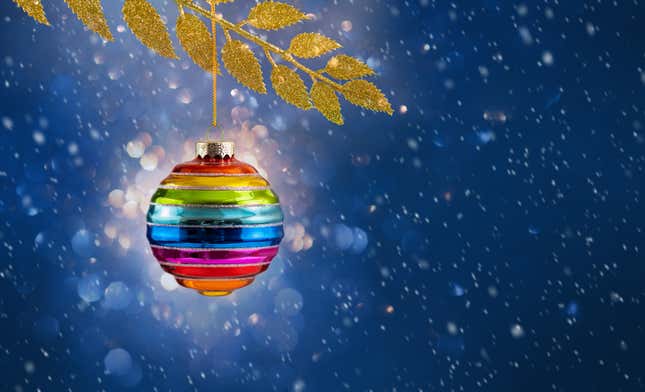
The holiday season is when many of us gather with our biological and chosen families to celebrate. For some, time with family can be restorative, uplifting, and joyous. However, for some of us in the Black lesbian, gay, bisexual, transgender, queer+, and same-gender loving (LGBTQ+/SGL) community, being around family can be challenging, if it’s even possible.
Too many of us suffer from family rejection and the stigma that shrouds myths about LGBTQ+ people fueled by ignorance, religious trauma, and fear. What is sometimes missed in stories about holiday cheer is that some of us experience various forms of violence from family members. Familial rejection, intolerance, and outright violence can deeply impact the mental health and physical well-being of members of our beloved community.
Black people generally have a tough time succeeding in the face of white supremacy. The implications of toxic stress, prolonged exposure to poverty, and trauma can take an exacting toll. The pressure that some of us feel is compounded for those of us who are also members of sexual minority communities.
And the challenges associated with being Black and queer, trans, and gender non-binary/non-conforming have been profound this year. More than 300 anti-LGBTQ bills have been introduced across state legislatures this year alone. There has been a 41% increase in hate crimes against LGBTQ+ people. More than 100 drag events have been targets of arson threats and instigated violence. The recent shooting at Club Q in Denver is also a reminder that too often, Black LGBTQ+ don’t have access to the safe spaces that too many of our non-LGBTQ+ siblings take for granted. All of this is to say that people who love Black people should go out of their way to ensure that each of us can feel safe and supported, especially in the spaces where we are supposed to find love.
Family rejection, in all forms, has a profound impact. 77% of Black LGBTQ+/SGL youth have heard family members say negative things about LGBTQ+ people. 47% have been taunted or mocked by family members for being LGBTQ+. And 21% of young LGBTQ+/SGL people in a very unaccepting community attempted suicide. The just released FBI Hate Crimes Report for 2021 showed that 32% and 39% of the hate crimes committed against both Black and LGBTQ+ people, respectively, took place in their homes - likely from family members.
Intimidation and assault were the two types of hate crimes committed most against our community. LGB youth who reported high family rejection were nearly ten times more likely to have attempted suicide, more than five times more likely to experience high levels of depression, and 3.4 times more likely to use illicit substances than those reporting little or no family rejection. Family rejection can also lead to homelessness, which puts youth at greater risk for adverse health and life outcomes. LGBT youth represent 40% of the youth homelessness agency clientele, and family rejection due to sexuality or gender identity was the most frequently cited reason for their homelessness.
These statistics should alarm anyone who cares about the well-being of Black people. We should all be concerned about the lasting trauma these acts of violence leave on members of our community.
Data also affirms the power of support. Supportive families can be a buffer against discrimination, harassment, and stigma—and words matter. People sometimes refuse to engage in discussion because they simply do not have access to or feel equipped to engage. To support asset-based conversations about Black queer, trans, and gender non-binary/non-conforming people, the National Black Justice Coalition developed a Terminology Workbook that offers language to support positive, respectful, and productive conversation. NBJC’s Words Matter Gender Justice Toolkit facilitates discussion and action to end gender-based violence experienced by Black women and girls.
Additionally, religion and spirituality have long been bedrock for Black people, which includes Black queer, trans, and non-binary/non-conforming members of our community. The American Psychological Association and others have engaged in research about the impact of religious trauma, which can prevent us from being happy, healthy, and whole. The Institute for Welcoming Resources provides resources for supporting churches in affirming all congregants.
Be selfish and prioritize your mental health this holiday season. Breathing can help reset your nerves and reduce the impact of stress on the body. Practice self-compassion by allowing yourself to feel everything as you feel it and not judge yourself harshly for your emotions. Consider picking up the book “The Untethered Soul” by Michael Singer, as he encourages allowing feelings to wash over you so that you do not get drowned by them. Enlist the support of a qualified, culturally competent mental health professional to help you not just survive but thrive.
However you decide to celebrate, whether on the couch in your pajamas or in the company of friends and family, I pray that you guard your joy.
Dr. David J. Johns is the executive director of the National Black Justice Coalition (NBJC), a civil rights organization dedicated to the empowerment of Black lesbian, gay, bisexual, transgender, queer+, and same-gender loving (LGBTQ+/SGL) people, including people living with HIV/AIDS.

